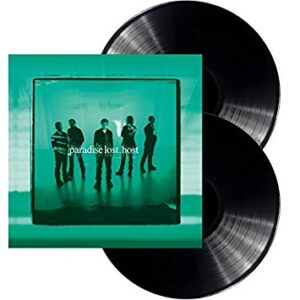
In 1999, Paradise Lost released their seventh, and most controversial, album. Whilst the majority of fans had remained onboard for the synth-heavy ‘One Second’, ‘Host’, by Nick Holmes’ own admission was a leap too far for some, and it saw a fan base that had expanded exponentially as a result of ‘draconian times’ fall away in droves. Looking back, the reaction seems extreme, but it has to be remembered that ‘Draconian Times’ was (and remains) a landmark album, a refinement of the band’s song-writing skill coupled with a splendidly beefy production and stunningly-beautiful artwork, all of which combines to justify the album’s status as an unassailable classic. The band, however, were already moving forward and the result was ‘one second’, an impressive album that spawned at least two earth-shattering tracks that remain live favourites to this day (‘say just words’ and the title track). Although some moaned about the short hair and streamlined production (this was the era of ‘load and reload’ after all), most people were too taken with the album’s splendid mix of atmospheric synth and heavy guitars to care. What they didn’t know was that the guitars were about to leave the picture…
Subtle, sinister, even beautiful, ‘Host’ took the synth elements of ‘one second’ to their logical conclusion, at the same time twisting and transmuting the guitars into something otherworldly and strangely alien. Closer inspection reveals the band never lost their edge (live performances of ‘so much is lost’ demonstrate just how much guitar is actually present in the mix), rather they chose to subvert it in favour of a colder, art-pop production that still sounds crisp and clear some twenty years on. Now remastered, the big draw for fans will be the fact this is the album’s first ever outing on vinyl (complete with etched 4th side), but there are no bonus tracks or other ephemera included to encourage a fresh purchase, so it basically comes down to the extent to which you need this album on vinyl and the quality of the remaster itself.
Unfortunately, the remaster is not an improvement upon the original in any way. Steve Lyon, the album’s original producer, did a remarkable job of mixing the band’s ambitious arrangements whilst Howie Weinberg made sure to leave the dynamic thrust of the songs intact. A simple listen to the remastered version’s take on the remarkable ‘it’s too late’, a song that builds considerably as it edges toward its climax, reveals an absolutely flat dynamic, all the life squeezed out if it in favour of giving each instrument equal priority in the mix. Although you can still hear the elements that make it such a powerful piece of music, the warmth of the original is entirely lost in a miasma of compression and the heavy-handed addition of treble in the EQ. Unfortunately, the rest of the album fares no better, and it’s hard to imagine anyone preferring this version over the original. Right from the start, the aura of disappointment is palpable. ‘So much is lost’, once a huge, vibrant and dynamic track, now seems to lack much of its vital energy. On the plus side the slithery synth lines that underpin the verse are now much clearer in the mix, but the pay off is that the chorus now barely registers, the aggressive compression resulting in a tangible drop in volume. Whereas with the original, turning up the volume bought whole new elements to life, on this remaster, turning up the track results in fairly rapid fatigue as each element vies for the attention (particularly noticeable when the strings appear) and a direct a-b comparison with the old EMI CD shows just how far wrong this new version has got it. Few tracks fair better. The exhilarating rush of ‘Permanent solution’ is painfully muted and the Massive Attack-esque piano of ‘ordinary days’ is no longer eclipsed by the sonic rush of rich bass and taut percussion found on the original. In short, it’s a revisionist mess.
To be fair, if you’ve not heard the original, the remaster does at least encourage a re-evaluation of a great album that was never given the credence it deserved. The band demonstrated an impressive learning curve in their integration of synths into the textures of their songs and the song-writing stands up remarkably well. If the album has any flaw, it’s simply that there is little apart from ‘it’s too late’ to change the overall tone of the album. Where ‘one second’ offered tracks like ‘Lydia’ and ‘blood of another’, ‘Host’ has a rather more homogenous tone, which adds to the dreamlike quality of the record as a whole, but which also sees a couple of numbers lost in the haze. That said, dreamlike and ethereal are the very qualities that make this such a special album in the band’s canon, and it deserves to be feted. However, the remaster, if anything, presents the album in a worse light than its 1999 incarnation. Perhaps on an MP3 player or in a car, the squashed dynamic will work in the album’s favour, but it’s easy to imagine the disappointment of anyone who buys this on vinyl hoping for a sonic revelation.
It took effort to get through this remaster, it really did. My familiarity with the original (‘Host’ is a long-time favourite of mine) coupled with the utter disappointment engendered by the remaster had me reaching for the EMI CD time and again just to make sure my memory of the tracks hadn’t failed me. It’s the same album, sure, but it’s like someone has reached in and ripped out its heart. If you’ve never heard ‘host’, or if you allowed the negativity that surrounded its release in some quarters to put you off, do yourself a favour and get a copy, but unless there’s no other choice, get the original – I can’t, in all honesty, recommend this version. Album – 9. Remaster – 2



